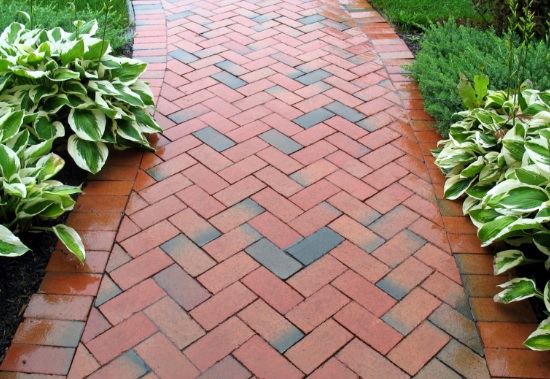The two main types of brick sealers that are used to seal interior and exterior brick and brick pavers are Silane-Siloxane water repellent sealers and wet look to high gloss acrylic sealers. Which type of brick sealer is best for sealing your brick will depend on what you want the brick to look like once sealed, and your reason for sealing the brick.
| Water Repellent Concrete Sealers | Acrylic Concrete Sealers |
| Won’t change the look of the concrete | Enhances with a wet look or gloss |
| Won’t stop color from fading | Stops color from fading |
| Works entirely below the surface | Leaves a visible surface film |
| Lasts 7-10 years | Lasts 1-5 years |
| Reduces staining and deterioration | Stops dusting, staining, deterioration |
| Can be used on cured concrete | Can be used on cured and uncured concrete |
Water-Repellent Brick Sealers: Silane-Siloxane water repellents are the best type of water repellent sealer to use on brick. They chemically react below the surface to form a water repellent barrier within the pores. Brick sealed with a Silane-Siloxane water repellent sealer are more resistant to staining and deterioration caused by water absorption. There are many benefits to using a water repellent sealer on brick including:
- Brick sealed with a water repellent brick sealer is more resistant to cracking, spalling, pitting, freeze-thaw damage, and salt damage.
- Brick sealed with a water repellent brick sealer is more resistant to mold and mildew growth.
- Brick sealed with a water repellent brick sealer is more resistant to efflorescence.
Best water repellent brick sealers:
- Armor SX5000 Concrete Sealer Review (average 4.8 star review)
- Siloxane PD Concrete Sealer Review (average 4.5 star review)
- DryWay Water Repellent Concrete Sealer Review (average 3.8 star review)
Acrylic Brick Sealers: Acrylic sealers are designed to enhance brick with a wet look, low gloss, or high gloss finish. They are also designed to provide complete surface protection by leaving behind a visible surface film.
Best acrylic brick sealers:
- Eagle High Gloss Sealer (average 4.6 star review)
- Armor AR350 Wet Look Sealer (average 4.8 star review)
- Armor AR500 High Gloss Sealer (average 4.9 star review)
- Enduraseal SB Acrylic Sealer (average 4.5 star review)
When applying an acrylic sealer to brick it is important to run a compatibility test. There aren’t many issues with concrete pavers, but red clay brick is very porous and allows for large amounts of sub-surface moisture to pass through. Acrylic sealers are very sensitive to moisture. If too much moisture is present during the time of application, or becomes present after a rain or snow storm, the moisture could cause the acrylic sealer to delaminate (turn white). You want to make sure that an acrylic sealer can hold up on your brick before applying the sealer to the entire surface. It never hurts to apply to a test area.

